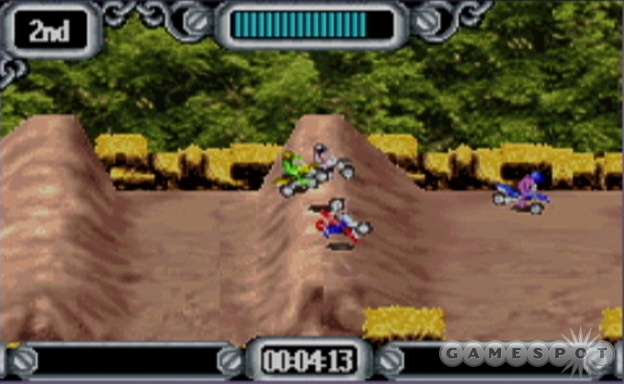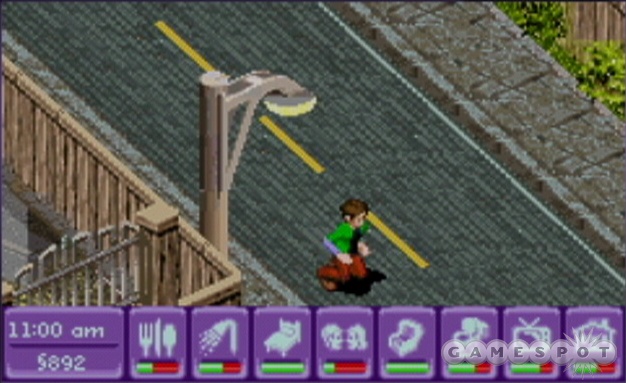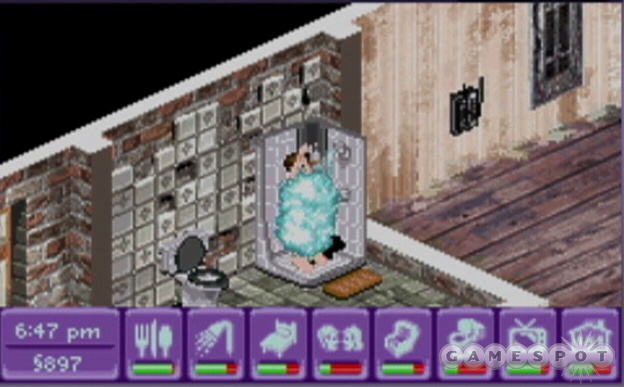Given the unprecedented success of The Sims, the EA and Maxis franchise that's all about controlling every aspect of the lives of little virtual suburbanites, it's not much of a shock that the series eventually took it to the streets. Enter The Urbz: Sims in the City, which is a hybrid of The Sims' easy-to-grasp, addictive gameplay and kid-friendly urban-hipster sensibility. The Game Boy Advance and Nintendo DS versions of the game, which are mostly identical, are actually full-on adventure role-playing games, featuring a lengthy quest, lots of characters to meet and interact with, and a number of fairly entertaining minigames. The game's mundane subject matter sometimes overwhelms the experience, since having to frequently rest, shower, and relieve yourself in the game is about as much fun as it sounds. But The Urbz nevertheless provides some surprising depth and lasting value.

You begin your urban adventure by creating your alter ego. You can choose to play as either a boy or a girl, whom you can name and customize with different-colored clothing. This modern rags-to-riches tale begins appropriately enough: You get fired from your menial job, and in your efforts to earn it back, you end up in even bigger trouble. You end up in the slammer, to be precise. Fortunately, you can convince the affable detective who puts you away to, in turn, put you on probation. You'll then earn some money from shooting hoops at a basketball court, and then use these funds to put a down payment on a new apartment. Now it's time to rise through the city's social hierarchy, by befriending everyone you meet, bettering yourself as a person, making lots of dough, and buying better stuff. The Urbz isn't a strictly linear adventure, but you'll still go through its main series of story-driven tasks sequentially, while exploring the New Orleans-inspired city of Miniopolis and interacting with all its denizens.
The Urbz turns out to be quite a long game, and will probably take you at least 20 or 25 hours to get through. On the DS, it can take even longer, since this version features additional content not found on the GBA--most notably, a unique series of missions involving an ambitious sushi chef, trained monkeys, and a pet show. You'll find that the city feels pretty big from the get-go, even though it's really only a couple of blocks in size. However, this is just the tip of the iceberg, as you'll unlock many more areas to explore as you progress through the story. Yet the real reason The Urbz provides such a long-lasting play experience is that the gameplay, partly for the better and partly for the worse, is noticeably padded out.
As in The Sims, your character here has a number of "motives" that you need to keep satisfied as you go about your other tasks. You'll be able to clearly monitor these via a series of colored bars onscreen, and filling them back up to optimal levels is a simple matter of using an appropriate object. For example, if your hygiene motive is running low, it's time for a shower, or if your bladder motive is running low, it's off to the toilet. Your apartment will be furnished with some of the basic amenities to help you stay on top of these important matters, but other places in the city will let you accomplish the same goals. In practice, you'll probably find that attending to all your motives is overly time-consuming. If one of your motives falls to less than 20 percent of its maximum, your character will fidget for several moments, and then become unresponsive to dialogue with other characters until you get that motive fixed. Plus, certain key appliances may eventually break, requiring you to take the extra time to get them repaired. There's plenty of additional gameplay in The Urbz, so doing all that while also maintaining your motives can feel like quite a handful. Still, you can't fault the game for giving you plenty to consider at any given moment.

The storyline focuses on your mostly selfish efforts to help the community ward off a money-grubbing land developer bent on turning Miniopolis into a soulless tourist attraction, but it takes a lot of amusing little detours along the way. For example, you'll unlock a broad assortment of minigames as you progress, and these are key because they're your best means of earning money in the game. Minigames include the previously mentioned basketball contest, a matching puzzle, window washing, stand-up comedy, motocross racing, and more. All these are simple, but some are quite challenging, such as the matching game and the motocross racing, the latter of which is a copy of the Nintendo Entertainment System classic Excitebike. You can level up in each of the minigames, which makes your success in them much more lucrative, but also quickens the pacing and makes the games themselves more challenging in other ways. At any rate, the variety of gameplay that these provide is refreshing, and they're nicely animated and fun to watch, at least for a while.
You level up in The Urbz much like you would in any other standard role-playing game. You have a number of statistics--such as body, creativity, and logic--that you can augment by repeatedly using certain objects. This is a bland process, requiring that you simply wait while your character conducts research on a computer, performs a soliloquy in the mirror, and so forth. But in exchange for your patience, you'll gain the skill necessary to level up in your favorite minigames, and therefore earn a lot more cash. It's possible to upgrade your character in other ways, too. There are a few different vehicles that you'll acquire during the course of the game, and you'll also find or be given special beads that can be exchanged for certain permanent bonuses called "xizzles." Probably the most useful of these bonuses make you more resistant to your motives, but even then, you'll still be spending lots of time sleeping, eating, and so forth. Even so, it's good that The Urbz has a fully realized character-building system.
Interacting with other characters is another major gameplay element in The Urbz, but it's pretty shallow. Some of the dialogue is snappy, but the interactions themselves are as simplistic as can be. Basically, when talking to another character, you'll be given three broad dialogue options at a time--for instance, ninjas, politics, and the river--and, depending on your choice, the character will respond positively or negatively. It's often easy to predict the outcome of a given dialogue option, too: Most characters in The Urbz are indeed as superficial as they look, so you'll have success talking to hipster chicks about money and shopping, while bespectacled students will respond well to conversations about science and aliens, and so forth. They will respond the same way to the same dialogue option each time, and there aren't that many dialogue options in total, so it's pretty easy to build up a good relationship with anyone you meet (assuming that's what you want). It's also really repetitive. Characters will respond with a brief, digitized bit of gibberish along with a little text, but since you'll mostly be interacting with characters because you need to befriend them, it becomes natural to just gloss over the dialogue while gradually boosting your affinity to the character.

The problem is, you sometimes get important clues or advice in the dialogue text, and if you miss them, you can easily lose track of what you're supposed to be doing. The game maintains a log of your pending missions, but the log entries don't provide specific details, so woe unto you should you happen to overlook an important bit of text. Mission-giving characters won't repeat themselves if you need them to, so you'll be left to wander around until you stumble upon the next leg of the mission. Sometimes this isn't so bad, since key characters will appear with a big exclamation point over their heads, but on other occasions, you might have to give something to someone, and keeping track of these goals is a lot tougher than losing track of them.
Nevertheless, The Urbz can be pretty fun and addictive, between managing your motives, mastering the minigames for maximum cash rewards, and advancing the sometimes-surprising storyline. There are really no cosmetic differences between the GBA and DS versions, each of which sports the same fairly smoothly animated but somewhat rough-looking prerendered graphics and the same clear, catchy, but slightly repetitive soundtrack. The game sounds a bit better than it looks, overall, and the fact that the visuals were clearly designed primarily with the GBA in mind is going to disappoint DS owners expecting the game to flex the new portable's polygon-processing muscle.
Of course, the DS version does take advantage of the touch screen--or, rather, it makes use of it. You still mostly play the game using the D pad and face buttons, but you'll need to use the touch screen to manipulate menus, such as to save your progress or to buy something. Sometimes it's advantageous to be able to see the main screen and subscreen at the same time, such as when you're trying to get your bearings while looking at your map. For the most part, though, it's easier to use the GBA's standard menus than the more-finicky touch-sensitive menus on the DS. Probably the most frustrating aspect of the DS menu system is the mechanic for buying stuff--you tap once on an item to get its description and pricing, and tap again to purchase it. Unfortunately, that second tap can easily happen by accident, which can cause you to spend huge amounts of money on something you didn't even want (you can sell it back for a fraction of what you just spent, or load a saved game and avoid making the same mistake). This isn't a crippling problem so much as an ironic annoyance.

There are some other differences between the two versions. Some of the minigames make use of the touch screen instead of the D pad. The text is sharper but smaller on the DS, making it somewhat more difficult to read, but you don't need to scroll through it, as you sometimes do on the GBA. The GBA also provides some basic multiplayer support--several of the minigames, including the Excitebike rip-off, let several players link up together. This option would have been welcome on the fledgling DS, with its wireless multiplayer features, but unfortunately it's absent. Again, though, the DS version of The Urbz is marginally better overall, since it features quite a bit more content, including several exclusive minigames and the previously mentioned missions. The exclusive content is mostly quite difficult to find, and you probably wouldn't instantly recognize it unless you're familiar with the GBA version's features, but it still adds more replay value to the game. Then again, these bonuses do come at a price, since the DS version of the game retails for more than the GBA version.
The Urbz is ultimately an unusual game for a variety of reasons. It's the first cross-platform port from the Game Boy Advance to the DS, and, hopefully, it's also going to be one of the last. After all, from a technical standpoint, it's perfectly clear that the DS is capable of a much more impressive presentation, both in terms of creative uses of the touch screen and in terms of sheer technical prowess. On the other hand, The Urbz is a fairly unique and interesting little role-playing game in its own right, which should appeal to fans of similarly themed games like The Sims, Animal Crossing, or Harvest Moon.